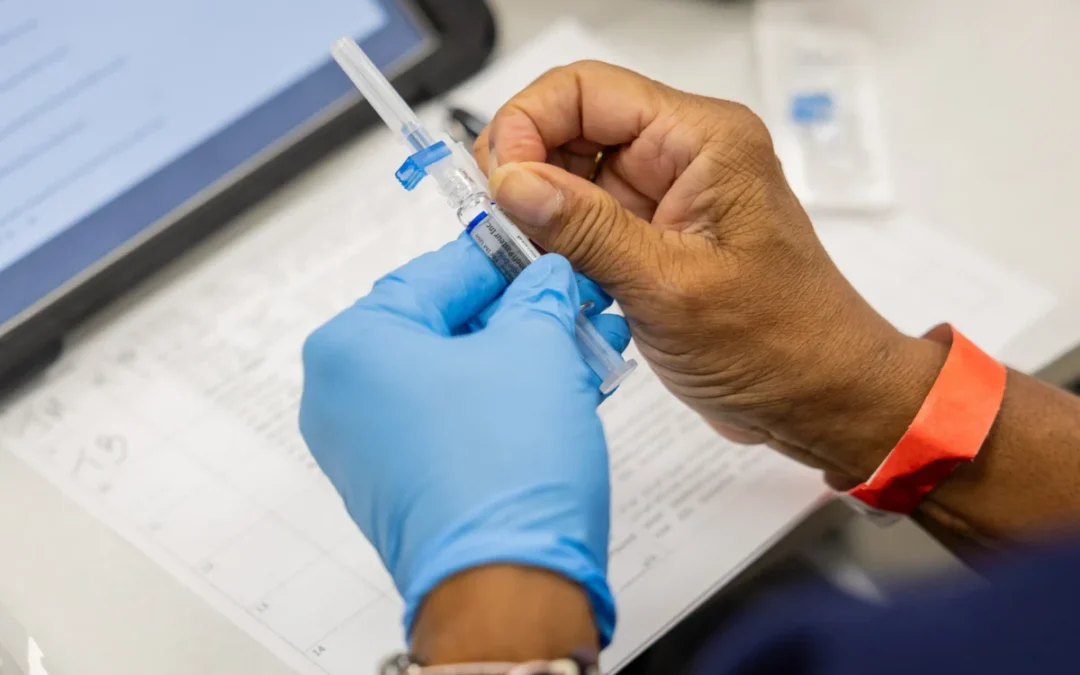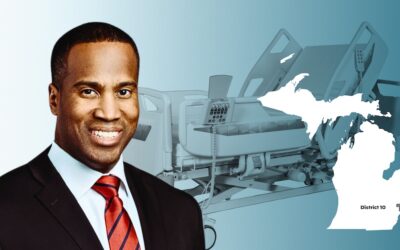
Photo Courtesy of UnSplash
A family physician looks for ways to fill the health care gap for rural patients.
Last month, ProMedica Coldwater Regional Hospital announced that it would be closing its Labor, Delivery, Recovery, and Postpartum department by the end of this year. The closure means that many Michiganders in the area will be forced to seek pregnancy-related services elsewhere—and will place extra pressure on the limited resources that are available.
“We only have 12 labor rooms in our facility. It’ll just be interesting to see how that plays out,” said Dr. Kari Beth Watts, a family physician at Western Michigan University’s School of Medicine that sees patients at Bronson Methodist Hospital in Kalamazoo—about an hour northwest of Coldwater.
Coldwater Regional isn’t the only Michigan hospital cutting care for expectant parents. Hospitals in other parts of the state—like Ascension Providence in Southfield—are ending their maternity care services, or shutting down their maternity wards altogether in an effort to save money.
While Watts is worried about how she and her staff will be able to accommodate the anticipated increase in patients seeking care further from home, she’s also focusing on making sure folks living in rural parts of her community don’t fall through the cracks.
“Sometimes we have to really collaborate and go take extra time to figure out how we can make this accessible for the patient,” said Dr. Watts. She said that this leads to having to find ways to work with health care specialists—like OB-GYNs or perinatologists—in other regions, to coordinate care based on each patient’s needs and any obstacles they may have when accessing care, like transportation issues or arranging childcare.
It’s the new reality for Michigan’s health care providers, and what thousands of Michiganders who live in one of our state’s maternity care deserts are going through. A 2023 March of Dimes report found that 18% of all counties in Michigan are considered maternity deserts. These are areas where maternity care services—like prenatal doctor visits, screenings for preeclampsia and other pregnancy complications, and birthing centers—are limited or nonexistent.
The same report from the March of Dimes found that “women in Michigan have a high vulnerability to adverse outcomes due to the availability of reproductive healthcare services.” It’s not just about access to a labor and delivery room when they need one—13% of pregnant people in Michigan are missing out on prenatal care, and women with chronic health conditions in Michigan have a 46% higher likelihood of preterm births.
Staffing shortages are particularly impacting all areas of our health care systems—including maternity care. During the pandemic, health care workers went above and beyond for their patients, working around the clock to provide care for thousands of Michiganders and their families.
“Staffing has been a huge issue, especially since the pandemic,” Watts said. “There’s a number of people that have left the health care field to go into travel nursing because it’s paying more.”
And recently, 1,300 health care professionals at the University of Michigan unionized with the United Michigan Medicine Allied Professionals (UMMAP) to demand a safe and supportive environment for workers and patients.
“When workers come together to make their voices heard they can make meaningful change,” said Terrence Martin, president of AFT Michigan, in a press release following the announcement. “With these new additions to UMMAP, we are building power to win fair raises for health care workers, improve working conditions, and create safer ratios that will benefit caregivers and patients alike.”
In the meantime, family physicians like Dr. Watts are crucial to helping fill gaps for pregnant patients.
“Most people don’t know that some family physicians can do obstetrics,” Watts said. “We’re so well positioned to kind of do all that wraparound care that we just want our communities to know that we are a resource for all of that.”
According to Watts, part of her mission as a family physician is to help mitigate the impacts of health care system issues—like maternity deserts—on patients in her community. This may mean taking extra time to help them figure out how to access care.
“Delivery planning is always really tricky. We help them make plans so that they can be near the hospital around the time of their due date,” she said. She added that this can be especially difficult when working with marginalized communities who already have less access to transportation or a variety of other factors that limit their ability to schedule care.

Photo Courtesy of Dr. Kari Beth Watts
Searching for solutions
While the health care struggle for Michiganders living in rural areas continues, there are potential solutions in sight.
In 2020, the Michigan Department of Health and Human Services (MDHHS) introduced the Mother Infant Health and Equity Improvement Plan (MIHEIP) in 2020.
Through the plan, several services and programs were introduced—and they paid off. In 2021, Michigan’s infant mortality rate was the lowest in our state’s recorded history, at 6.2 per 1,000 live births.
This year, MDHHS launched Advancing Healthy Births—a four-year plan that picks up where the MIHEP left off. The new plan highlights four priority areas: expanding access to quality reproductive health care and education across Michigan, full-term babies that are born at a healthy weight, sleeping safety for infants, and ensuring that parents and babies have access to behavioral and mental health services.
MDHHS is also expanding and supporting Michigan’s doula network—for which they received funding from Governor Gretchen Whitmer—in an effort to further reduce maternal and infant disparities.
Doulas are non-clinical, trained birth professionals who provide emotional, physical, and informational support to pregnant people and their families before, during, and after birth. Doula services have proven to have a positive impact on the communities that they serve, and are often more accessible to people in rural communities.
In addition to creating more policies and legislation to help rural Michiganders receive maternity care, telemedicine has been proven to benefit rural communities when used to supplement routine prenatal and postpartum care. To make telemedicine even more accessible across the state, MDHHS began working with health tech company Philips earlier this year to develop a mobile app that will allow Medicaid-eligible users to access information on fetal growth and personalized support with just a few clicks on their phone.
“MDHHS is excited to be able to offer the Pregnancy+ app to Michigan families to support them during this exciting time in their lives,” said chief medical executive Dr. Natasha Bagdasarian in a press release. “We want to ensure they are able to access the resources they need, and to learn about important topics including immunizations, hearing screening, breastfeeding, and other information designed to improve the health of moms and babies.”
In Kalamazoo, Dr. Watts said telemedicine and apps can go a long way in patient education.
“We can be flexible and accommodate with telehealth,” she said, and noted that teaching patients how to properly measure their vitals—like blood pressure, weight, and so on—can be beneficial for both the patient and health care provider. “It will make them feel empowered in their pregnancy and also help them monitor things that we’d be monitoring in-clinic.”
While it certainly takes a village to raise a child, Watts thinks it’s important that people turn to their “village” during pregnancy, too—even sharing their stories of struggling to receive maternity care.
“If folks in the communities feel like their experience or my loved ones’ experience would’ve really benefited from access to telemedicine or being connected to a doula, or a support person, let’s share those stories,” she said. Every year, Watts and her colleagues do—along with other issues their communities are facing—with fellow health care providers at the Michigan Academy of Family Physicians.
“It’s really effective from a legislative standpoint,” Watts said. “I think we all can connect on wanting a healthy community. I think the more we keep sharing stories and keep having a shared value there, I think folks get on board.”
Support Our Cause
Thank you for taking the time to read our work. Before you go, we hope you'll consider supporting our values-driven journalism, which has always strived to make clear what's really at stake for Michiganders and our future.
Since day one, our goal here at The 'Gander has always been to empower people across the state with fact-based news and information. We believe that when people are armed with knowledge about what's happening in their local, state, and federal governments—including who is working on their behalf and who is actively trying to block efforts aimed at improving the daily lives of Michigan families—they will be inspired to become civically engaged.


A new car vs. health insurance? Average family job-based coverage hits $27K
By Phil Galewitz, KFF Health News With the federal shutdown entering its fourth week, spurred by a stalemate over the cost of health insurance for...

Fighting a health insurance denial? Here are 7 tips to help
By: Lauren Sausser When Sally Nix found out that her health insurance company wouldn’t pay for an expensive, doctor-recommended treatment to ease...

It’s almost flu season. Should you still get a shot, and will insurance cover it?
Madison Czopek, PolitiFact August 18, 2025 For parents of school-aged children, the fall to-do list can seem ever-growing. Buy school supplies. Fill...

Opinion: Health care is at risk as Grad PLUS loans face the chopping block
The ‘One Big, Beautiful Bill Act’ strips critical funding from medical students and threatens care in rural and underserved communities. We never...

Macomb County households will start losing money this year under Trump’s new spending law. Here’s how much—and who let it happen
Families in Michigan’s 10th Congressional District will shoulder over $500 million in lost funding, while billionaires cash in. In the neighborhoods...





